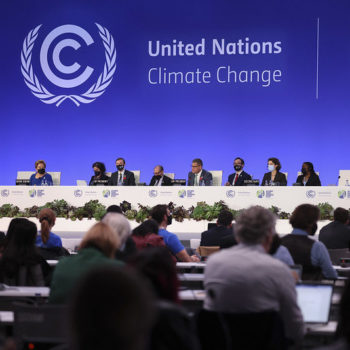The latest UN climate conference (COP26) has opened a door for greater alignment between countries’ climate and trade policies. Agreements in Glasgow may foster both green technology transfers and climate investments in the Global South. In addition, COP26 has created some momentum for addressing harmful fossil fuel subsidies and expanding sectoral climate cooperation.
Tackling the climate crisis requires an urgent transformation of the global economy towards cleaner production and consumption. Key negotiation streams at the UN climate conferences (COP) can significantly affect global trade for the better. However, there has been a limited alignment of the World Trade Organisation (WTO) and the UN Framework Convention on Climate Change (UNFCCC) agendas in the past.
But we are seeing a change in this area. Trade issues have arguably had a larger imprint on this year’s COP26. With countries already gathered in Glasgow, the US and China announced their co-sponsorship of WTO conversations on greening trade policy. Moreover, the EU and the US announced bold new moves to enhance climate action through sectoral decarbonisation deals. With COP26 concluded, we take stock of where progress was and was not made to align trade and climate policies.
- Carbon markets. Glasgow has finally delivered on a critical aspect of the Paris Agreement Rulebook: Article 6. This article has the potential to strengthen mitigation projects in the Global South, incentivising further private climate finance. Initial estimates suggest the potential market size of international carbon credits could be between $100-400 billion per year by 2030. Global South Sellers will capture a large share of them. This additional revenue will increase the investment case for renewable technologies, reforestation tools and engineering services to ensure emissions reductions. Now is time for trade ministries to figure out ways to facilitate the flow of these green goods and services. It’s a path some small progressive nations are trailblazing despite little support from more prominent players.
- Technology transfers. Facilitating green trade is far from enough to ensure developing economies favour green development over their “right to pollute”. Effective technology transfers, flanked with capacity-building programmes, remain essential to ensure all Global South countries can participate fairly in green supply chains. The final COP26 decision urges developed nations to enhance technology transfers and R&D cooperation to assist developing nations’ efforts on climate change mitigation and adaptation. However, previous commitments in this area have often not materialised. Much more impetus is needed to push trade Ministers at the WTO to facilitate the spread of clean technologies, including by addressing Intellectual Property rights and public procurement. Initiatives like the First Movers Coalition may contribute to this impetus.
- Response measures. Many had feared the EU’s recent Carbon Border Adjustment Mechanism (CBAM) proposal would create additional tensions at COP26. Several developing countries, including Bolivia, Venezuela and the African Group, supported by Saudi Arabia, indeed pushed to denounce the negative effects of “unilaterally applied mitigation policies”—code-talk for CBAM— and support “open trade”. However, there was not enough consensus to include such language in the final decision. Nonetheless, countries introducing border carbon adjustments should take heed of some leaders’ warnings against “carbon colonialism” by including explicit support for Least Developed Countries affected by border adjustments.
- Sectoral deals. Initiatives outside the Paris Agreement framework could grow into more detailed sectoral deals, driving international cooperation on climate change mitigation and on trade and industrial policies. So far, they have focused on ending unabated coal, accelerating steel decarbonisation, phasing-out polluting cars, halting deforestation and reducing methane emissions. According to early estimates, the deals may help reduce the 2030 emissions gap by an additional nine per cent.
- Fossil fuel subsidies. Despite watered down in the final stretch, COP26’s decision referenced ending fossil fuel subsidies. The language is flanked by initiatives on ending both overseas and domestic public support. However, there is still a lot of domestic action needed to phase out fossil fuel subsidies. Now it’s time to seize this momentum by encouraging agreements on eliminating harmful fossil fuel subsidies at the G20, the OECD and eventually the WTO.
Progress made in these five key areas at COP26 represent opportunities for aligning trade regimes with climate action worldwide. The first litmus test will be at the end of November, at the WTO’s 12 Ministerial Conference. There, the momentum from COP26 should provide a helpful boost to ministers seeking to agree on a landmark declaration on aligning trade and climate policies across the globe.


